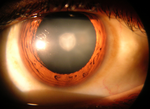
06 Dec Cataract Surgery Linked to Lower Risk of Dementia
MedicalResearch.com Interview with:

Dr. Lee
Cecilia S. Lee, MD, MS
Associate Professor,Director, Clinical Research
Department of Ophthalmology
Harborview Medical Center
University of Washington Seattle, WA
MedicalResearch.com: What is the background for this study?
Response: Cataract is a natural aging process of the eye and affects the majority of older adults who are at risk for dementia. Sensory loss, including vision and hearing, is of interest to the research community as a possible risk factor for dementia, and also as a potential point of intervention. Because cataract surgery improves visual function, we hypothesized that older people who undergo cataract surgery may have a decreased risk of developing Alzheimer disease and dementia.
We used the longitudinal data from an ongoing, prospective, community based cohort, Adult Changes in Thought (ACT) study. The ACT study includes over 5000 participants to date who are dementia free at recruitment and followed until they develop Alzheimer disease or dementia. We had access to their extensive medical history including comprehensive ophthalmology visit data. We investigated whether cataract surgery was associated with a decreased risk of developing Alzheimer disease and dementia.
MedicalResearch.com: What are the main findings?
Response: We found that the participants with cataract who underwent cataract surgery had nearly 30% lower risk of developing dementia from any cause compared with those who did not, and this lowered risk persisted for at least a decade after surgery. We found similar results with reduced risk of developing Alzheimer disease as well. We controlled for an extensive number of health-related confounders and potential sources of biases but still found strong associations after accounting for these factors.
MedicalResearch.com: What should readers take away from your report?
Response: The study results support the growing significance of the eye-brain connection for dementia research. Our group has previously shown that several neurodegenerative eye diseases such as age-related macular degeneration (AMD) are associated with increased risk of Alzheimer disease and dementia. Further research is critically needed to understand the mechanism that could explain the connection between the eye diseases and development of dementia. Better understanding the connection between the aging eye and brain may offer insights and potential therapies to slow or prevent age-related dementia in the future.
Older adults who are experiencing symptoms of cataract such as night driving difficulty or seeing halos around bright lights should be evaluated by ophthalmologists (not optometrists), who specialize in eye surgeries. Our study results suggest that eye health is important in older adults and that there may be an added benefit to removing cataract in addition to improving visual acuity and visual function.
MedicalResearch.com: What recommendations do you have for future research as a result of this work?
Response: We are hoping that future research will provide insights into potential mechanisms to explain such strong associations between cataract surgery and reduced risks of dementia. We are continuing to take advantage of large datasets such as that of ACT cohort to gain novel insights in understanding the relationship between the aging eyes and aging brains. In addition, we are combining the recent advances in the non-invasive retinal imaging technology and artificial intelligence (AI) techniques to further study the role that the eye may play in future dementia research. (https://comp.ophthalmology.uw.edu)
Citation:
Lee CS, Gibbons LE, Lee AY, et al. Association Between Cataract Extraction and Development of Dementia. JAMA Intern Med. Published online December 06, 2021. doi:10.1001/jamainternmed.2021.6990
Disclosures:
The study was funded by NIH grants NIH/NEI K23EY029246, NIH/NIA R01 AG060942, NIH/NIA P50 AG05136, NIH/NIA U01AG006781, NIH/NIA U19 AG066567, Alzheimer’s Drug Discovery Foundation Diagnostics Accelerator Award, Latham Vision Innovation Award, and an unrestricted grant from Research to Prevent Blindness.
Dr A. Y. Lee reported receiving grants from Carl Zeiss Meditec, Novartis, Regeneron, and Santen; receiving personal fees from Genentech/Roche, Johnson & Johnson, Topcon, the US Food and Drug Administration, and Verana Health; and receiving nonfinancial support from Microsoft and NVIDIA outside the submitted work. Dr Larson reported receiving royalties from UpToDate outside of the submitted work. No other disclosures were reported.
JOIN OUR EMAIL LIST
[mailpoet_form id="5"]We respect your privacy and will never share your details.
[last-modified]
The information on MedicalResearch.com is provided for educational purposes only, and is in no way intended to diagnose, cure, or treat any medical or other condition. Always seek the advice of your physician or other qualified health and ask your doctor any questions you may have regarding a medical condition. In addition to all other limitations and disclaimers in this agreement, service provider and its third party providers disclaim any liability or loss in connection with the content provided on this website.
Last Updated on December 6, 2021 by Marie Benz MD FAAD
